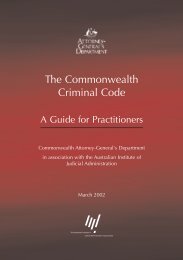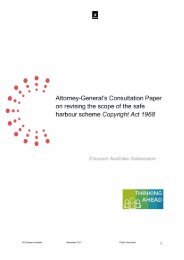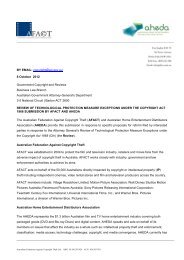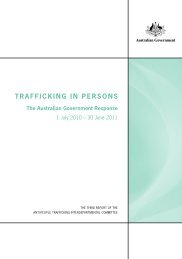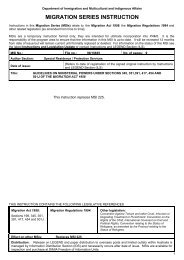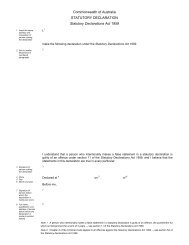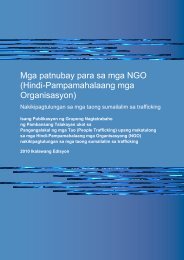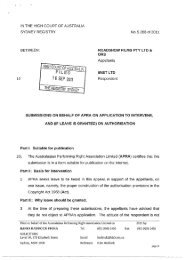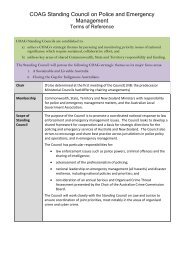Normann Witzleb [PDF 657KB] - Attorney-General's Department
Normann Witzleb [PDF 657KB] - Attorney-General's Department
Normann Witzleb [PDF 657KB] - Attorney-General's Department
You also want an ePaper? Increase the reach of your titles
YUMPU automatically turns print PDFs into web optimized ePapers that Google loves.
C. ‘Required or authorised by or under law’<br />
The Proposals<br />
70 All three reports recommend a defence for conduct ‘required or authorised by or<br />
under law’. The reports explain that this defence is important for government agencies,<br />
in particular in relation to law enforcement and national security. 118<br />
Comment<br />
71 The defence for conduct ‘required or authorised by or under law’ is familiar from the<br />
existing the Information Privacy Principles and National Privacy Principles in the Privacy<br />
Act 1988 (Cth). 119 It concerns the relationship of privacy with other areas of law and<br />
seeks to ensure that the legal order does not impose conflicting demands on the<br />
addresses of privacy obligations. Because of its potentially very wide ambit, this defence<br />
raises a large number of considerations, including the questions of what amounts to<br />
‘authorisation’ and when a requirement or authorisation is contained in ‘law’. 120<br />
72 One concern with this proposed defence, which originated in public law, is that its<br />
implications in the context of private law may not have been fully considered. The<br />
defence needs to apply differently to government agencies and to private sector<br />
organisations. The statement in the NSWLRC report that conduct is not authorised<br />
simply because there is no law prohibiting it, 121 may be apposite in the context of<br />
government agencies which can only exercise the powers that are granted to them.<br />
However, in relation to private organisations and individuals, it contradicts the axiom of<br />
common law that ‘everyone is free to do anything, subject only to the provisions of the<br />
law’. 122<br />
73 This defence is significant because it deals with the interaction of the privacy action<br />
and other areas of law. If conduct that is authorised by any other law, was by virtue of<br />
the defence taken not to be unlawful, the defence would subordinate the privacy cause<br />
of action to all other laws. A defence of potentially such wide ambit would need to be<br />
considered more deeply than in the reports before it is enacted.<br />
D. ‘Fair Comment’<br />
118 VLRC Report 18, at [7.158]; NSWLRC Report, at [6.3].<br />
119 VLRC Report, Rec 28(c). This defence is also contained in the Canadian Privacy Acts.<br />
120 See further, Australian Law Reform Commission, Review of Australian Privacy Law, Discussion Paper<br />
72, 2006, ch 13.<br />
121 NSWLRC Report, at [6.4]. See also Office of the Federal Privacy Commissioner, Plain English Guidelines<br />
to Information Privacy Principles 8–11: Advice to Agencies about Using and Disclosing Personal<br />
Information (1996).<br />
122 Lange v Australian Broadcasting Corporation (1997) CLR 520; [1997] HCA 25, at 564 (CLR) quoting A-G<br />
v Guardian Newspapers (No. 2) (Spycatcher) [1990] 1 AC 109, at 283.<br />
25


![Normann Witzleb [PDF 657KB] - Attorney-General's Department](https://img.yumpu.com/26247895/25/500x640/normann-witzleb-pdf-657kb-attorney-generals-department.jpg)

